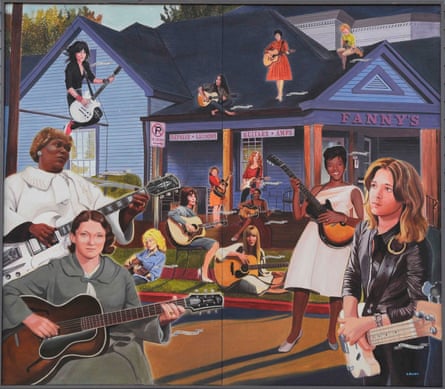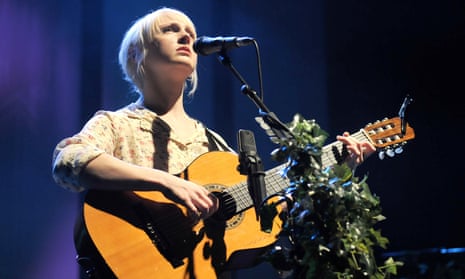From the moment a woman takes an interest in music, she enters a culture that is dominated by men – whether it’s the staff in record shops, the bands in your local pub or the roadies for stadium gigs. In the UK, women make up just 5% of all sound engineers, according to industry group SoundGirls. The Music Producers Guild estimates only 6% of its members are women.
Tonight, more than two-thirds of the live music acts performing in the UK will feature no women on stage, according to a Guardian analysis. Of the 370 gigs listed for 12 October on the Ents24.com listings website, 69% of the acts (255) are made up entirely of men, while just 9% (33) are female-only (half of these are solo artists).
Of the 82 mixed-gender acts, just under three-quarters contain no more than one woman in the line-up. Ents24 says this pattern is consistent for the year: 74% of tickets sold via the site in 2017 have been for all-male acts.
Leading female musicians and industry figures say the intimidation and exclusion begins in childhood, with girls not being encouraged to play guitar or join bands. Many shared anecdotes of the frustrations and vulnerabilities they’ve felt as female artists: “An old manager told me that he wouldn’t be sending out my music, he would just send out my photo to labels,” recalls writer and musician Emma-Lee Moss, known as Emmy the Great. “But you just have to battle through that.”
“If you prevent women from seeing any examples of them achieving, then it prevents them from believing they can achieve it,” says guitarist and singer-songwriter Laura Marling, who addressed gender inequality and its effects in her podcast Reversal of the Muse.
“In my experience there are surface visible things, like touring on my own and then realising that all the people I perform with are men. Or that I wasn’t encouraged as much to play the guitar as men,” says Marling. “For women to achieve they have to go around that bump; they have to be as good, if not better, than their male counterparts.”
Predictably, this gender disparity is evident right up to the highest levels of the industry. Of this summer’s festival headliners in the UK, eight out of 10 were male; on the business side, just 30% of senior executive roles are occupied by women.

“It’s a misrepresentation of our own identity, as we have a society where 50% of the population are women,” says Vanessa Reed, CEO of the PRS for Music Foundation, a leading music charity. “If you’re underrepresented in an industry, you’re going to feel like you have less reason to put yourself forward or less chance of getting support. You need to see it if you’re going to be it,” she says.
Hip hop artist Shay D, one of the acts performing in London tonight, says female performers are still treated as a “novelty” by promoters. “I’ve had so many issues with promoters who want to book you because ‘they need some female energy’,” she says. “What’s so annoying is that it’s only when they need to fill a quota or to look as if they’re being fair.”
The Guardian analysed the gender split of music performances listed for the 12 October on the Ents24 website as of 4 October. The analysis focused on contemporary popular music categories such as rock, indie, electronic and folk, excluding classical music and tribute acts. In a few instances the gender breakdown of acts was unclear, for example solo artists who may perform with a backing band, and could not be confirmed.
Shopping for a boyfriend?
The lack of female representation is even present at music stores, one of the first places you go when you start playing an instrument. The experiences of women in these male-dominated spaces have sparked widely shared anecdotes – from being asked if they’re shopping for a boyfriend, to the assumption that they have no knowledge of instruments or equipment.
“My personal biases are certainly there – my experiences have tainted me in a way – but you check yourself in those environments because you’re alien there,” says Marling. “There’s a stereotype of a curmudgeonly man [in guitar shops] who collects things he doesn’t want anyone to touch. But it’s a different intimidation women feel.”
Marling can only recall buying a guitar from a woman once, at Fanny’s House of Music in Nashville, Tennessee. The shop’s owners, Pamela Cole and Leigh Maples, met studying music in the 1980s as the only two female bassists in their class. They founded and manage Fanny’s together, to create an inclusive space for women.

“We’ve tried to be comfortable for everybody, including men,” says Cole. “I don’t think there’s another guitar shop in the world that does it our way – that has only women [guitarists] on the walls and is run by women. Which is daunting.”
Marling says she never felt intimidated in Fanny’s music shop. “It must be what it feels like for men,” she adds. “Women are completely readjusting our idea of what our futures will be – and men are also readjusting. But it’s hard, and it takes time.”
Buying your first instrument is “a huge moment for a person who wants to be a musician”, says Moss. “It’s a real shame when someone is interested in music and is put down by someone behind a counter. The way to combat that is to make sure there’s enough of a support network around everyone so that when you go to a friend and say, ‘I couldn’t buy the guitar I wanted because I felt embarrassed’, they will tell you that’s bullshit.”
In the UK, the PRS Foundation launched Women Make Music in 2011, a programme to encourage more female songwriters and composers to come forward for music-related grants, after they discovered just 16% of applications were from women. Dice, a gig listings app, started Girls Music Day in 2016: a series of talks to inspire young women to get involved in the music industry. And this year, PRS Foundation and Festival Republic launched ReBalance: a Leeds-based programme to offer studio time for female-led bands, and promote female producers and engineers.
Sadie Dupuis, of the band Speedy Ortiz, says she tries to only work with promoters who prioritise gender diversity. “Promoters should do the same thing; look at the bills you’re booking and make sure you’re creating an environment on stage that can make the crowd feel safe and like they’re welcome at the show,” she says.
For music journalist Jen Long, inspiring the next generation is paramount. “How do you change people’s perceptions? By putting on events, raising awareness that girls can do this, and giving girls positive female role models,” she says.
According to Moss, “When powerful organisations like PRS start trying to make movements and conversations happen, that’s when the rules change and that’s when grants are created.
“The most important thing for helping women is to give them the means and space and the channels to do that, so it would be great if the music labels followed suit,” she says. “That – and just telling every women you know who wants to be a musician that yes, she can.”
- If you have experiences relating to this article that you’d like to share, email us at inequality.project@theguardian.com
- Follow the Guardian’s Inequality Project on Twitter here

Comments (…)
Sign in or create your Guardian account to join the discussion